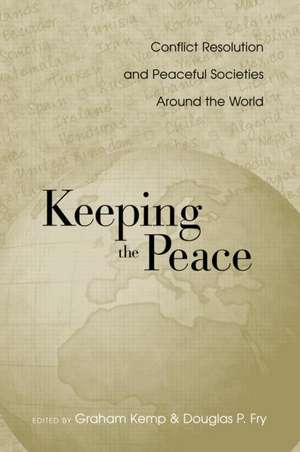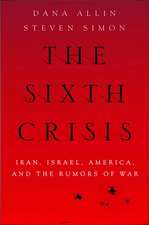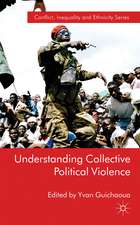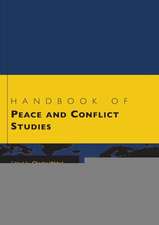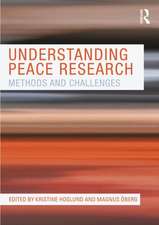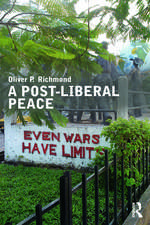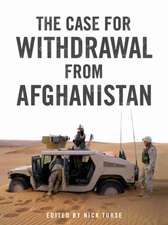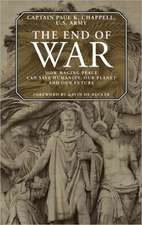Keeping the Peace: Conflict Resolution and Peaceful Societies Around the World
Editat de Graham Kemp, Douglas P. Fryen Limba Engleză Paperback – 7 oct 2003
| Toate formatele și edițiile | Preț | Express |
|---|---|---|
| Paperback (1) | 326.56 lei 22-36 zile | +22.93 lei 5-11 zile |
| Taylor & Francis – 7 oct 2003 | 326.56 lei 22-36 zile | +22.93 lei 5-11 zile |
| Hardback (1) | 1006.07 lei 43-57 zile | |
| Taylor & Francis – 7 oct 2003 | 1006.07 lei 43-57 zile |
Preț: 326.56 lei
Nou
Puncte Express: 490
Preț estimativ în valută:
62.49€ • 65.42$ • 51.70£
62.49€ • 65.42$ • 51.70£
Carte disponibilă
Livrare economică 17-31 martie
Livrare express 28 februarie-06 martie pentru 32.92 lei
Preluare comenzi: 021 569.72.76
Specificații
ISBN-13: 9780415947626
ISBN-10: 0415947626
Pagini: 252
Ilustrații: 10 pictures, 2 bar graphs, and 10 tables
Dimensiuni: 152 x 229 x 19 mm
Greutate: 0.46 kg
Ediția:1
Editura: Taylor & Francis
Colecția Routledge
Locul publicării:Oxford, United Kingdom
ISBN-10: 0415947626
Pagini: 252
Ilustrații: 10 pictures, 2 bar graphs, and 10 tables
Dimensiuni: 152 x 229 x 19 mm
Greutate: 0.46 kg
Ediția:1
Editura: Taylor & Francis
Colecția Routledge
Locul publicării:Oxford, United Kingdom
Recenzii
"Out of the thousands of books published about violence, war, and what to do about them, this one will stand out as an exemplar of what we should be doing at the start of a new millennium. Graham Kemp and Douglas Fry have done us all a great service by compiling vital information about how people organize peaceful, collective lives." -- Lester Kurtz, editor-in-chief of The Encyclopedia of Violence, Peace and Conflict
"A wonderful book! Filled with detailed accounts of societies that manage conflict so that they rarely become violent, Keeping the Peace provides grounds for hoping that we too can invent ways to reduce the violence in our culture." -- Joseph de Rivera, co-editor of Believed in Imaginings: The Narrative Construction of Reality
"Well-suited for classroom use, this collection explores peace in a diverse range of human societies. It reveals the values and methods used to forge lives, not without conflict, but where conflict is addressed through non-violent means. The lesson of this book is to stop dreaming of peace, and join together in building a more peaceful world-it can be done." -- R. Brian Ferguson, editor of The State, Identity, and Violence: Political Disintegration in the Post-Cold War World
"A wonderful book! Filled with detailed accounts of societies that manage conflict so that they rarely become violent, Keeping the Peace provides grounds for hoping that we too can invent ways to reduce the violence in our culture." -- Joseph de Rivera, co-editor of Believed in Imaginings: The Narrative Construction of Reality
"Well-suited for classroom use, this collection explores peace in a diverse range of human societies. It reveals the values and methods used to forge lives, not without conflict, but where conflict is addressed through non-violent means. The lesson of this book is to stop dreaming of peace, and join together in building a more peaceful world-it can be done." -- R. Brian Ferguson, editor of The State, Identity, and Violence: Political Disintegration in the Post-Cold War World
Cuprins
Chapter 1 The Concept of Peaceful Societies, Graham Kemp; Chapter 2 A Positive Concept of Peace, Ximena Davies-Vengoechea; Chapter 3 Contentious But Not Violent: The Hopi of Northern Arizona, Alice Schlegel; Chapter 4 Restraint and Ritual Apology: The Rotumans of the South Pacific, Alan Howard; Chapter 5 Respect for All: The Paliyans of South India, Peter M. Gardner; Chapter 6 Multiple Paths to Peace: The “La Paz” Zapotec of Mexico, Douglas P. Fry; Chapter 7 Resolving Conflict Within the Law: The Mardu Aborigines of Australia, Robert Tonkinson; Chapter 8 Putting a Stone in the Middle: The Nubians of Northern Africa, Robert Fernea; Chapter 9 Keeping the Peace in an Island World: The Sama Dilaut of Southeast Asia, CLifford Sather; Chapter 10 A Model of Peacefulness: Rethinking Peace and Conflictin Norway, Kristin Dobinson; Chapter 11 Cautious, Alert, Polite, and Elusive: The Semai of Central Peninsular Malaysia, Robert Knox Dentan; Chapter 12 Conclusion: Learning from Peaceful Societies, Douglas P. Fry;
